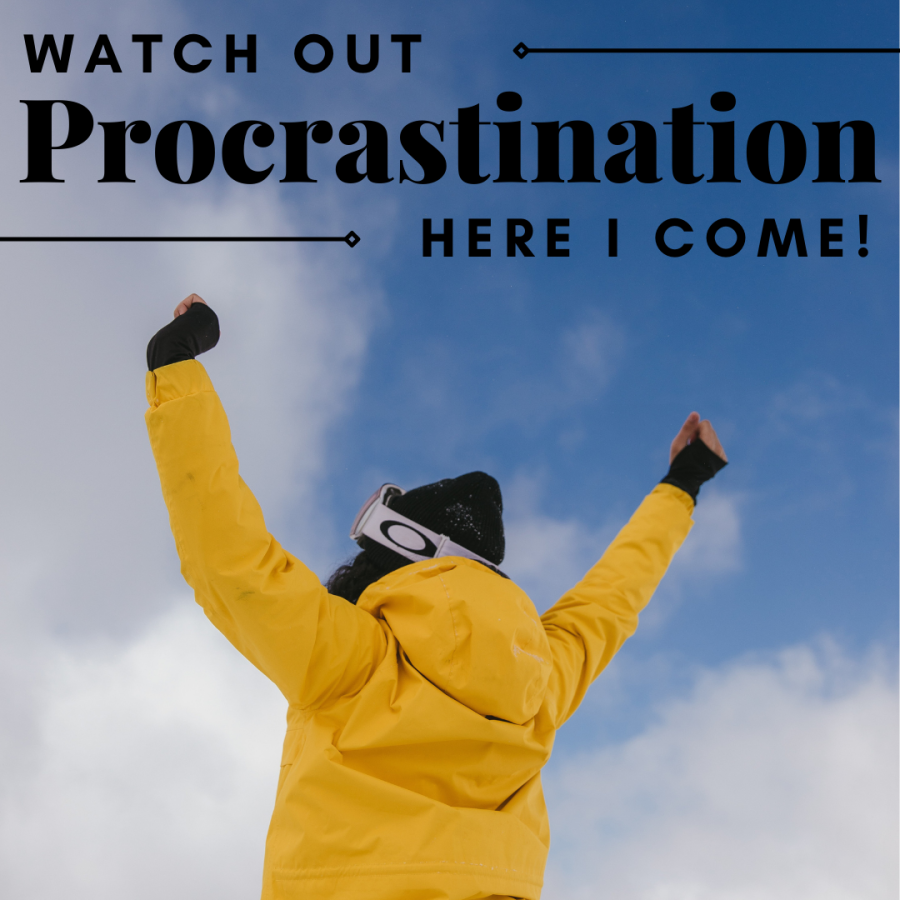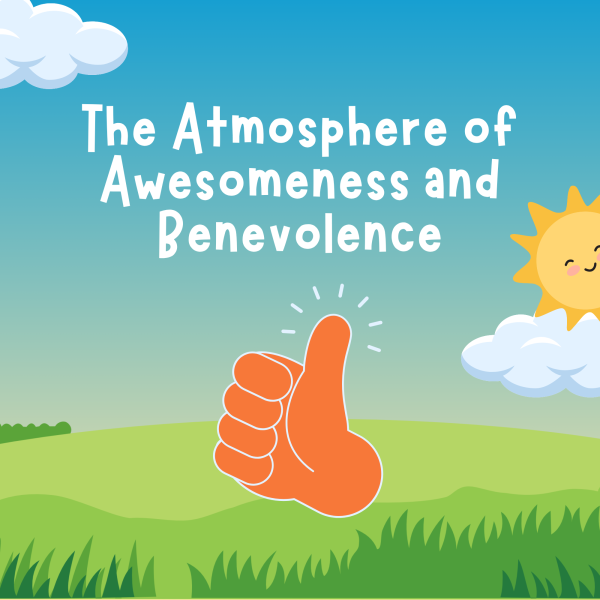WATCH OUT PROCRASTINATION, HERE I COME!
How To Conquer Procrastination— Help From Juliana Mun and iUniversity Prep
I’ll get to that later…
How many times have you asked yourself the question, “Do I really have to do it now?”
For many people in the world, including myself, that question is asked several times a day. Whether it’s regarding chores, school work, or taking down the Christmas Tree that’s still up in April, procrastination buries its fingers into our lives all the time. It’s the pesky whisper in our head, pushing us to a problematic conclusion that we in fact do not have to accomplish the task now and that it can wait for later—even though most times that is not the case.
Prying procrastination off our shoulders and utilizing our self control to wrestle it off, is a lot harder than people make it seem. It takes a mental push, an inner bodied skill, to transform our comfortable mindset and convince ourselves that finishing it now is better than later. But how? How do you battle with the temptation within the body that is literally wired to crave sleeping and mindless scrolling rather than work?
Warring Against Yourself
Like Robert Ballard once said, “The greatest discoveries all start with the question ‘why?’”
So when considering procrastination, we should first start with asking ourselves why it happens in the first place. Why are humans so prone to pushing things off for later? Why is it so common that there’s a word dedicated to describing the phenomenon?
Procrastination happens when our motivations and self control are outweighed by negative factors, luring us to push tasks off. Hindering factors can include many things including anxiety, fear of failure, tiredness and lack of motivation. It doesn’t pertain to just one category! Procrastination is basically a failure to regulate our behavior because of those hindering factors. It’s why we postpone things and why a rift between what we want to accomplish and what actually happens is formed.
Every single time we cave into that voice in our head telling us we “always have time later,” or that “you don’t have to do it right now” is a moment where we lose to procrastination. It’s the hardest kind of combat, which is combat with yourself and your own comfort, which means you need powerful defensive tactics.
Such as what you might ask?
Turns out procrastination has happened enough that people before us have methods we can borrow.
Thief of Time
Procrastination is often fueled by your distaste for it.
I mean how many times have you criticized yourself for being a procrastinator? How many times have you procrastinated even more because of that? The Productive Procrastination method works to fight against that way of thinking, by using (believe this) more procrastination. By organizing your work into time increments and placing specific slots in that schedule, devoted just to procrastinating, you can battle against strenuous amounts of it.
It seems contradictory, but it’s worked for a lot of people, and with the method also comes a requirement to flip the meaning of the negative words you always tell yourself. Instead of “Why am I such a failure at time management” try “I’m trying my best and by actively working towards success, I’m spending my time well.”
There are also other methods like the Seinfeld Method that focuses heavily on a consistent schedule to remove any thoughts of procrastination and the Procrastination Equation that forces you to introspect and bury into the root of the problem of why you might be procrastinating. All of them work towards the same goal, which is to put yourself back on track and go straight ahead, not allowing procrastination to distract you.
And really, the battle against procrastination is constant for many people and it always takes gentle reminders towards ourselves to urge us back to that track. It’s always easy to fall into temptation, but eventually, our bodies will be attuned with the task at hand and we will finally catch that thief of time before it can steal anymore.
iUP Vs. Procrastination
Did I mention Procrastination is common?
And by common, I mean common. Several iUP students and even iUP staff have struggled with it, showing you how you are not alone in your battle. There are people actively fighting near you.
Brooke Bolinger, the Eyes on Owls section editor, commented that she has had her fair share of procrastination. Usually, instead of doing the work she’s supposed to do, she watches TV or talks with her friends, distracting herself from the task at hand. Her way of dealing with procrastination is, “What I like to do is get one thing I really need to do out of the way, and then when I finish I reward myself in some way, whether that be talking to a friend for a few minutes or watching a YouTube video that I have been wanting to see, then I start on the next thing I need to finish and repeat the process. This gives me time to do what I need to do, but also give myself some rest between the big projects or tasks I need to complete.”
IHoot’s EIC (Editor in Chief), Eve Bamber, also shared about her experience of procrastination saying, “Procrastination is creating excuses not to do something. Whether it be because something is too hard, will take too long, or you just don’t feel like it today, procrastination is finding ways to push things aside…. scheduling & time blocking have really saved my life. “ She goes on to advise owls to just use her “Start with 5 technique” which is where you start with five minutes on your task and because it’s always hard to just start, you usually end up finishing.
Emma Powell, A tenth grader attending iUP, described when procrastination affected her negatively, “An example would be waiting to do a school project until the last minute. I’m always penalized because I end up falling behind and becoming even more stressed about it because I didn’t start it earlier.” She explains further, “While it seems nice to take a break, in the end it will end up becoming more difficult adding more consequences. While I still struggle with procrastination, I’ve learned to just start early and take it one step at a time so I’m able to complete my tasks in a timely manner.”
An English teacher here at iUP proves that adults also struggle through procrastination just like our students do. Ms. Williams says this about it, “I am definitely no stranger to procrastinating. As a student and in my career, I have had times when I put off something until the last minute. (And) while I haven’t been penalized with a 0 or lectured by a boss, I have found that the penalties are much more internal. I can be hard on myself and when I procrastinate I feel like I don’t like myself as much as I do when I can cross things off my list and get that feeling of being productive.”
While on the topic, Ms. Williams also gives some great advice to students using her personal experiences, “The advice I would give with my fellow procrastination victims is to just rip the bandaid off so to speak. I have found that the longer I put off a task that is undesirable for whatever reason, the more stress and guilt build up in me which is honestly more painful than just getting the task done… Whether it be an English essay, cleaning your room, or having a difficult conversation with someone, getting that daunting task out of the way and crossing it off your to-do list feels so much better than the crushing weight of procrastination.”
Do It Now
All these stories from our iUP staff and students have similar conclusions and that is, “Just do it!”
Procrastination is heavy, burdening, and a thorn on our side. The battle is internal, conflicts just beneath the skin, and I’ve also had my fair share of bad experiences because of it. From staying up past midnight because of a pushed back assignment or conflict with the people around me because of my tardiness, procrastination has always managed to push me down. I’ve even battled it while writing this article, which as ironic as it is, is a very honest statement.
It’s when I sat down and forced my fingers to type the first word that I finally beat that intimidating voice in my head, the one that seemed to lure me to being unproductive every time. Suddenly when I’m writing the paragraphs, skimming through research, and actually in the midst of accomplishing my task… it’s wasn’t so scary anymore. The best way to beat procrastination is to change your mindset where you believe you have a later. Instead, live in the moment, think about the present, and how you’re going to finish instead of when.
Later doesn’t exist.
Do it now.
Sources
Solving procrastination. Solving Procrastination. (n.d.). Retrieved January 21, 2022, from https://solvingprocrastination.com/why-people-procrastinate/#:~:text=%20Reasons%20for%20procrastination%20%201%20Abstract%20goals.,procrastinate%20because%20they%20view%20their%20future…%20More%20
says:, A. (2021, December 16). How to stop Procrastinating & Get Things Done. The Simplicity Habit. Retrieved January 30, 2022, from https://www.thesimplicityhabit.com/how-to-stop-procrastinating/#:~:text=The%20key%20for%20how%20to%20stop%20procrastinating%20is,Putting%20it%20off%20just%20makes%20it%20feel%20worse.
says:, R., says:, L. B., 31, N. W. says: D., says:, N. W., Author, P., says:, W., & *, N. (2020, August 6). How to stop procrastinating: 5 tips from a psychologist. Nick Wignall. Retrieved January 30, 2022, from https://nickwignall.com/how-to-stop-procrastinating/

Hi, my name is Juliana Mun and I'm in tenth grade at iUniversity Prep. This is my first year at iUPrep. Some hobbies of mine are writing, shopping, and...












Makenna Horne • Feb 1, 2022 at 10:35 am
Did I take the time to read your article as I procrastinated an assignment? Quite possibly… But that’s beside the point. This article is SO SOPHISTICATED, JULIANA!!! It was such an amazing read! It really seems like it was written by a professional writer!
Juliana Mun • Feb 4, 2022 at 10:21 am
makenna, thank you so much !! always a joy to hear from you.